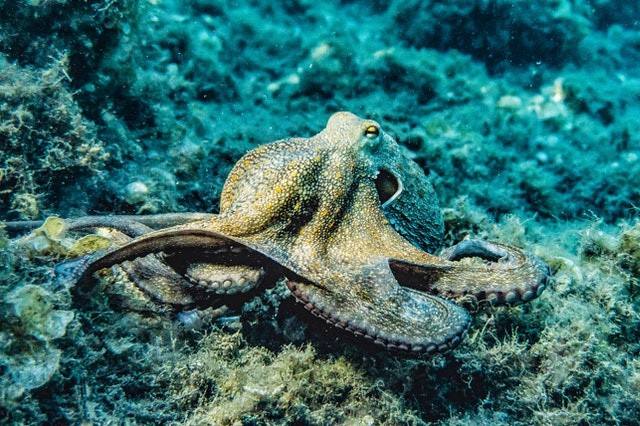According to Dr. Alex Schnell, working with octopuses is difficult because of their emotional swings. They might be outgoing and social one day and then refuse to leave their den the next, according to a cephalopod behavioral ecologist.
Clever Animals

Octopuses are clever, sophisticated organisms that can alter the color and texture of their skin, disguise themselves, utilize tools, and fit into small areas. In 2020, the Oscar-winning documentary My Octopus Teacher, depicting a filmmaker's friendship with an octopus, brought their complicated existence into the public eye.
While the common octopus, Octopus vulgaris, may have won hearts, it is also at the center of plans by Nueva Pescanova, a Spanish fishing firm, to build the world's first commercial octopus farm in the Canary Islands next year.
Growing Demand for Octopus
Although there is a growing demand for octopus meat (the number of octopuses collected in the wild quadrupled between 1980 and 2014), industrial octopus cultivation has remained elusive.
Companies and scientists have been working for decades to overcome the various issues it provides, including keeping hatchlings alive, calculating tank temperatures, and finding the correct diet, from Spain and Mexico to Japan and Hawaii. The aim is to raise a fast-growing, easy-to-reproduce animal that sells for a high price.
With a factory that it promises would eventually produce 3,000 tons of octopus flesh per year, Nueva Pescanova looks to be on the verge of winning this race. According to the corporation, the farm will not only meet the rising demand for octopus flesh, but it will also reduce strain on wild populations.
Yearly Harvest

Each year, more than 350,000 tonnes of octopus are harvested in China, Japan, and Mexico, and natural populations are thought to be quickly dwindling. According to a Nueva Pescanova spokeswoman, farming octopuses is vital to "preserve a species of high environmental and human significance."
Criticisms
Critics argue that raising these complex animals would result in a tremendous deal of misery and mirror the harmful effects of factory farming on land. Last year, the United Kingdom declared octopuses to be sentient entities.
When maintained in close quarters with others, octopuses, normally solitary animals, can become violent. Dr. Becca Franks, an environmental studies research scientist at New York University, said captive octopuses have been known to devour their arms and are "famous escape artists," implying they don't appreciate being held in tanks.
Ethical Concern
They require stimulation, according to Schnell. Schnell was part of a team of experts who analyzed more than 300 scientific publications on consciousness in invertebrates, including octopuses, for a study published by the London School of Economics in 2021.
While cows, pigs, and other farmed animals are conscious, Schnell says we know more about their welfare requirements. She claims that there are no behavioral proxies for gauging octopus welfare. Establishing one would be difficult because of the large variations in their behavior from day to day.
Schnell is especially concerned about how the octopuses will be slaughtered. "There is no credible humane killing procedure that could be implemented on a huge scale economically," she stated. Clubbing, severing their brains, and asphyxiation in a net are all techniques used to kill octopuses found in the wild.
Carlos Rosas, a biologist, working with Nueva Pescanova at Mexico's National Autonomous University, argues that welfare concerns are a "distortion."
He explained that they're attempting to provide the finest habitat for the animals because they want to flourish. Rosas utilizes tubes, boulders, and artificial grasses in tanks to replicate more natural circumstances at his small-scale demonstration farm in Yucatán. He claims that his octopuses never escape.
Rosas said it's uncertain whether these conditions could be duplicated at the industrial scale suggested by Nueva Pescanova. He thinks octopus farming may provide economic prospects - "in Mexico, aquaculture is an option for impoverished people who live on the coastlines" - and agrees with Nueva Pescanova that it can help relieve pressure on wild populations.
Benefits of Farming
Farming's ability to combat overfishing, on the other hand, is contested. According to a 2019 study, aquaculture does nothing to mitigate the adverse effects of wild fishing and may even increase seafood demand.
According to Schnell, the only approach to relieve pressure on wild stocks is raising prices and promoting octopus flesh as a delicacy.
The farms may still need wild-caught fish to feed the octopuses, putting even more strain on the oceans. "The industry needs to explain raising carnivores since it makes no sense from a sustainability standpoint," Jennifer Jacquet, associate professor of environmental studies at New York University, said.
Related Article : Female Octopus Avoids Harassment By Hurling Shells at Persistent Male
For more animal news, don't forget to follow Nature World News!
© 2025 NatureWorldNews.com All rights reserved. Do not reproduce without permission.





